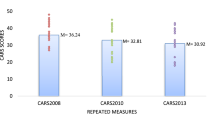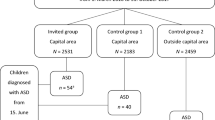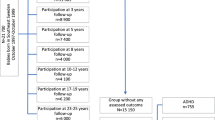Abstract
This empirical study explores participants' perceptions of information and understanding of their children's and their own involvement in a longitudinal screening, the ABIS Study. ABIS (All Babies In Southeast Sweden) is a multicentre, longitudinal research screening for Type 1 diabetes and multifactorial diseases involving 17 005 children and their families. For this study, a random selection of mothers was made, using perinatal questionnaire serial numbers from the ABIS study. In total, 293 of these mothers completed an anonymous questionnaire (response rate 73.3%). Our findings from the questionnaire indicate a marked difference between the reported satisfaction with and understanding of the information provided on the one hand and the significant lack of knowledge of some of the aims and methods of the ABIS screening on the other, namely concerning high-risk identification of involved children, potential prevention and future questionnaires. Two questions evoked by our results are: (1) what information is required for participants in longitudinal studies involving children? and (2) how do we ensure and sustain understanding, and thus in a prolonging, informed consent in these studies? This study underlines the importance of an increased understanding of the ethical issues that longitudinal research on children raise and the need to discuss how information and informed consent strategies should be analysed and designed in longitudinal studies.
Similar content being viewed by others
Log in or create a free account to read this content
Gain free access to this article, as well as selected content from this journal and more on nature.com
or
Notes
(for example, World Medical Association (1964) Declaration of Helsinki. Ethical Principles for Medical Research Involving Human Subjects; The Belmont report (1979) Office of the Secretary. Ethical Principles and Guidelines for the Protection of Human Subjects of Research; International Ethical Guidelines for Biomedical Research Involving Human Subjects (1982). Prepared by the Council for International Organisations of Medical Sciences (CIOMS) and WHO; Recommendation No. R (90) 3 Concerning Medical Research on Human Beings. Council of Europe, Committee of Ministers. The Nüremberg Code, the Declaration of Helsinki, and the CIOMS code of 1982 (1993) also emphasise the need, even duty, to ensure that the research subjects have understood the information.)
(Informed consent is here understood in the following way: When someone (A) has given (B) his or her consent to an intervention-trial (T), the following conditions have been met: (1) B has asked A about participation in T; (2) B has given adequate information about T and about B's participation in T; (3) A was a competent person; (4) A sufficiently understood the conditions of participating in T; (5) A consented to participate in T; (6) A's consent was made voluntarily; (7) A notified B of his/her consent to participate in T (authorisation).
References
Golding J : European Longitudinal Study of Pregnancy and Childhood (ELSPAC). Paediatr Perinatal Epidemiol 1989; 3: 460–469.
Golding J, the ALSPAC Study Team: Children of the nineties: a resource for assessing the magnitude of long-term effects of prenatal and perinatal events. Cont Rev Obstetr Gynaecol 1996; 8: 89–92.
Ludvigsson J, Ludvigsson M, Sepa A : Screening for pre-diabetes in the general child population may be reassuring. Pediatr Diabetes 2001; 2: 170–174.
Gustafsson Stolt U, Liss P-E, Svensson T, Ludvigsson J : Attitudes to bioethical issues: a case study of a screening project. Soc Sci Med 2002; 54: 1333–1344.
Harper PS, Clarke A : Should we test children for ‘adult’ genetic diseases? Lancet 1990; 335: 1205–1206.
Clarke A : Introduction. The genetic testing of children. Oxford: Bios Scientific Publishers, 1998.
Chadwick R, Shickle D, ten Have H (eds): The ethics of genetic screening. Dordrecht: Kluwer Academic Publishers, 1999.
Marteau TM, Richards MPM (eds): The troubled helix: social and psychological implications of the new human genetics. Cambridge: Cambridge University Press, 1996.
Michie S, Marteau TM : Predictive genetic testing in children: the need for psychological research. Br J Health Psychol 1996; 1: 3–14.
Chadwick RF, Thompson AK (eds): Genetic information. Acquisition, access, and control. New York: Kluwer Academic/Plenum Publishers, 1999.
Harper PS, Clarke AJ : Genetics, society and clinical practice. Oxford: BIOS Scientific Publishers, 1997.
American Society of Human Genetics: Points to consider: ethical, legal, and psychological implications of genetic testing in children and adolescents. Am J Hum Gen 1995; 57: 1233–1241.
Emanuel EJ, Wendler D, Grady C : What makes clinical research ethical? JAMA 2000; 283: 2701–2711.
Chadwick R, Levitt M, Shickle D (eds): The right to know and the right not to know. Avebury: Aldershot, 1997.
Reilly PR, Boshar MF, Holtzman SH : Ethical issues in genetic research: disclosure and informed consent. Nat Genet 1997; 15: 16–20.
Beauchamp TL, Childress JF : Principles of biomedical ethics, 5th edn. New York: Oxford University Press, 2001.
Knoppers B, Avard D, Cardinal G, Cranley Glass K : Children and incompetent adults in genetic research: consent and safeguards. Nat Rev 2002; 3: 221–224.
Ross LF : Predictive genetic testing for conditions that present in childhood. Kennedy Inst Ethics J 2002; 12: 225–244.
Ross LF, Moon M : Ethical issues in genetic testing of children; in Beauchamp T, Walters L (eds): Contemporary issues in bioethics, 6th edn: Wadsworth: Thomson Learning, 2003.
Hope T : Empirical medical ethics. J Med Ethics 1999; 25: 219–222.
Michie S, Bobrow M, Marteau TM, on behalf of the FAP Collaborative Research Group: Predictive genetic testing in children and adults: a study of emotional impact. J Med Genet 2001; 38: 519–526.
Marteau TM, Lerman C : Genetic risk and behavioural charge. BMJ 2001; 332: 1056–1059.
Goodenough T, Williamson E, Kent J, Ashcrot R : What did you think about that? Researching Children's perceptions of participation in a longitudinal genetic epidemiological study. Children Soc 2002; 17: 113–125.
O'Neill O : Some limits of informed consent. J Med Ethics 2003; 29: 4–7.
Knoppers BM, Avard D, Cardinal G et al: Children and incompetent adults in genetic research: consent and safeguards. Nature 3: 221–224.
Giardiello FM, Brensinger MS, Petersen GM et al: The use and interpretation of commercial APC gene testing for familial adenomatous polyposis. N Engl J Med 1997; 336: 823–827.
Joffe S, Cook EF, Cleary PD, Clark JW, Weeks JC : Quality of informed consent: a new measure of understanding among research subjects. J Natl Cancer Inst 2001; 93: 139–146.
Moreno J, Caplan AL, Wolpe PR, the members of the project on informed consent, Human Research Ethics Group: Updating protections for human subjects involved in research. JAMA 1998; 280: 1951–1958.
Beskow LM, Burke W, Merz JF et al: Informed consent for population-based research involving genetics. JAMA 2001; 286: 2315–2321.
Doyal L, Tobias J (eds): Informed consent in medical research. London: BMJ Books, 2000.
[8] Alderson P : Young Children's Rights. London: Jessica Kingsley, 2000.
European Convention on the Exercise of Children's Rights. Strasbourg, 1996.
International Symposium ‘Bioethics and the Rights of the Child’. Considerations on Bioethics and the Right of the Child, Monaco,: 2000.
Bjorn E, Rossel P, Holm S : Can the written information to research subjects be improved? An empirical study. J Med Ethics 1999; 25: 263–267.
Acknowledgements
We would like to thank all the families who participated in this research. We are grateful to the ABIS nurses and Ann-Christine Gilmore-Ellis for their support during the research process. This study was financially supported by the JDF-Wallenberg Foundation (Grant K98-99JD-12813-01A), the Soderbergs Foundation and the Swedish Child Diabetes Foundation (Svenska Barndiabetesfonden). Ethical approval for the study was obtained from the regional research ethical committee at Linköping University.
Author information
Authors and Affiliations
Corresponding author
Rights and permissions
About this article
Cite this article
Stolt, U., Helgesson, G., Liss, PE. et al. Information and informed consent in a longitudinal screening involving children: a questionnaire survey. Eur J Hum Genet 13, 376–383 (2005). https://doi.org/10.1038/sj.ejhg.5201336
Received:
Revised:
Accepted:
Published:
Issue date:
DOI: https://doi.org/10.1038/sj.ejhg.5201336
Keywords
This article is cited by
-
Survey of motivation to participate in a birth cohort
Journal of Human Genetics (2016)
-
Psychological Impact of Screening and Prediction in Type 1 Diabetes
Current Diabetes Reports (2011)
-
Comparison of group counseling with individual counseling in the comprehension of informed consent: a randomized controlled trial
BMC Medical Ethics (2010)
-
Concern, pressure and lack of knowledge affect choice of not wanting to know high-risk status
European Journal of Human Genetics (2007)



